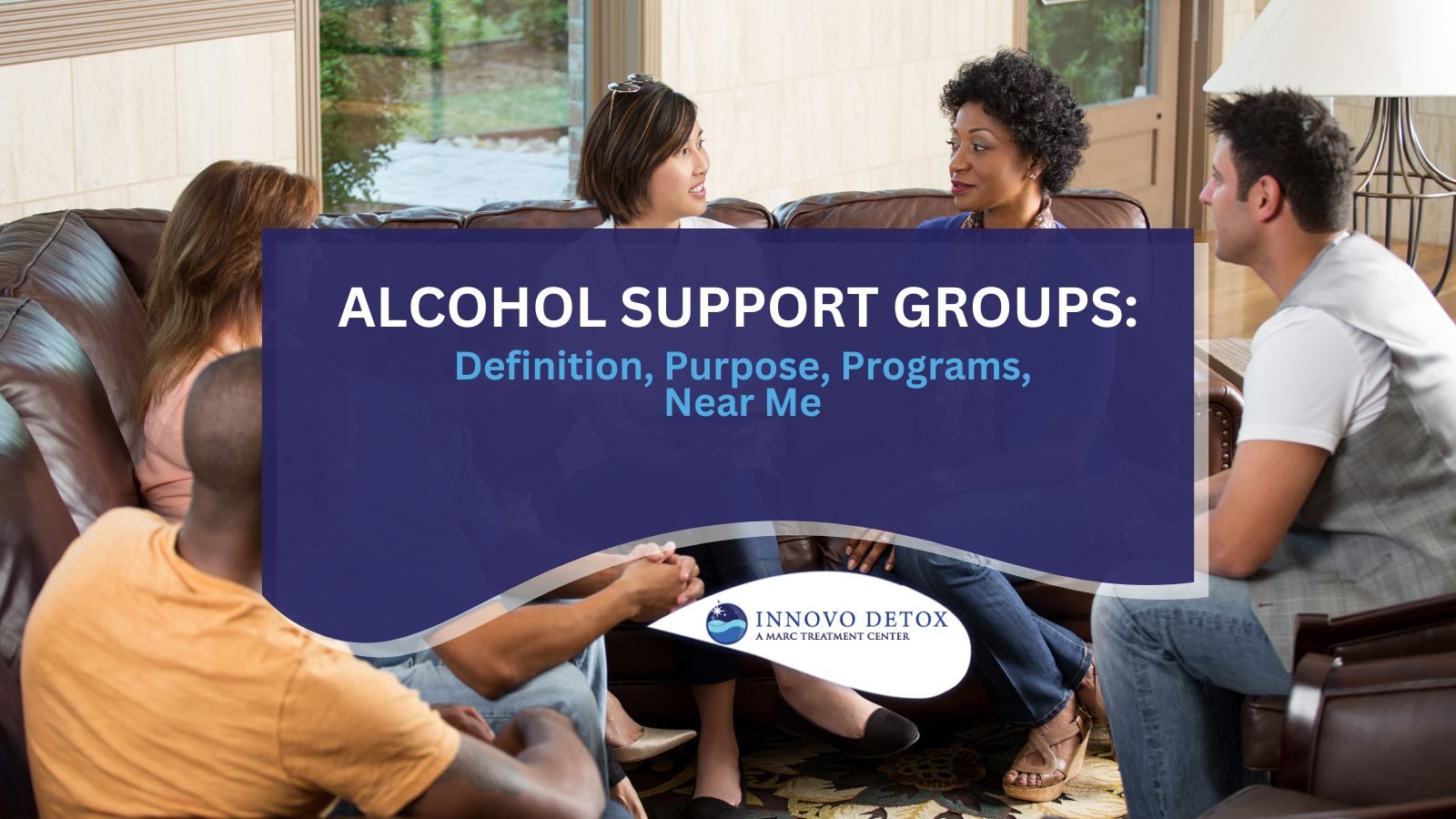Alcohol support groups provide a safe environment for individuals recovering from alcohol addiction to share experiences and receive mutual support from others on the same path. According to a study by the National Institute on Alcohol Abuse and Alcoholism (NIAAA) titled “Alcohol Use Disorder and Alcohol Treatment,” 2023, over 8.5 million adults in the U.S. engage in group recovery programs to help maintain sobriety and prevent relapse.
The purpose of alcohol support groups is to promote sobriety through accountability, shared experiences, and emotional connection with others facing alcohol-related struggles. According to the NIAAA, participation in support groups leads to a 30–35% increase in sustained recovery outcomes among individuals with alcohol use disorder.
Alcohol support group programs include a variety of structured peer-led or professionally facilitated meetings, such as Alcoholics Anonymous (AA), SMART Recovery, and LifeRing, designed to address different recovery needs and beliefs. According to a study by the Substance Abuse and Mental Health Services Administration (SAMHSA) titled “Behavioral Health Services Information System,” 2023, over 60% of substance abuse treatment facilities in the U.S. incorporate some form of peer support group into their recovery programs.
Alcohol support groups near you are found through directories such as the AA Intergroup website, SAMHSA’s treatment locator, or local mental health resource centres. According to the NIAAA, online directories and local outreach have expanded access to support groups by 40%, enabling broader participation across both urban and rural areas.
What Are Alcohol Support Groups?
Alcohol support groups are organized gatherings of individuals who share similar experiences with alcohol addiction and its challenges. These groups offer a safe, non-judgmental environment where members share their struggles, victories, and progress in overcoming alcoholism.
The goal is to provide a sense of community, encouragement, and peer support to those seeking recovery from alcohol addiction. These groups operate on a model that emphasizes mutual support, with members helping each other through shared experiences and offering guidance based on their recovery journeys.
Support groups are crucial in the process of addiction recovery, as they help individuals develop a strong support network. This network becomes essential for maintaining sobriety and avoiding relapse.
The peer support system plays a key role in reinforcing positive behavior and providing individuals with a sense of belonging during a difficult and isolating process. Support groups for alcoholics, such as Alcoholics Anonymous (AA), are based on the idea that group recovery is more effective than individual efforts alone. The group setting fosters a collective strength, offering accountability and shared wisdom.
According to the National Institute on Alcohol Abuse and Alcoholism (NIAAA), support groups are integral to alcohol recovery, with an estimated 8.5 million people in the U.S. using group therapy and peer support models to aid in their sobriety. This prevalence highlights the importance of support networks in treating alcoholism and substance use disorders.
What Is The Purpose Of Alcohol Support Groups In Recovery?
The purpose of alcohol support groups in recovery is to provide emotional support, facilitate peer connection, and offer a structured environment for individuals seeking long-term sobriety.
These groups play a pivotal role in the recovery process by fostering a sense of belonging and mutual understanding, which is crucial for individuals facing the challenges of alcoholism. Support groups create a safe space where individuals share their experiences, learn from others, and gain valuable insights that promote recovery.
Alcohol support groups also serve as an essential component of relapse prevention. By attending regular meetings, participants maintain accountability, receive guidance, and gain the emotional support needed to cope with triggers and cravings.
This continuous support helps individuals navigate the complexities of sobriety, making it easier to stay on track over the long term. Furthermore, these groups are instrumental in addressing the mental health aspects of alcohol addiction, providing a holistic approach that addresses both physical and emotional recovery needs.
According to a study by the National Institute on Alcohol Abuse and Alcoholism (NIAAA) titled “Alcohol Use Disorder and Alcohol Treatment,” 2023, support groups are vital in the recovery process, helping individuals achieve better outcomes by reducing relapse rates and improving overall well-being.
What Are The Types Of Alcohol Support Group Programs Available?
The types of alcohol support groups are 12-Step Alcohol Support Groups, Non-12-Step Alcohol Support Groups, Faith-Based Alcohol Support Groups, and Secular Alcohol Support Groups. Each type offers a unique approach to peer support, addressing the varying needs of individuals in recovery while fostering a sense of community and accountability.
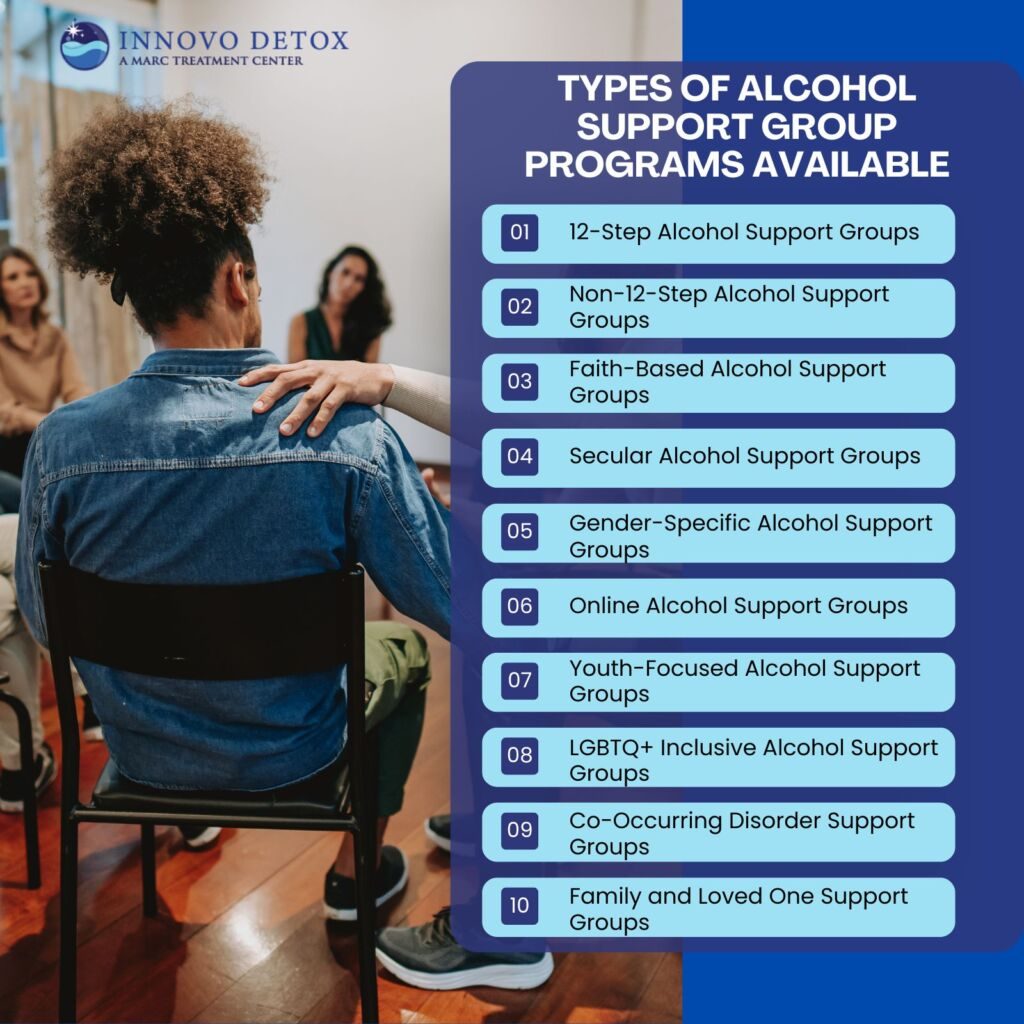
The types of alcohol support group programs are explained below:
12-Step Alcohol Support Groups
12-Step Alcohol Support Groups are a structured form of peer support that follows a set of principles outlined in the 12 steps, which aim to help individuals recognize their addiction, seek spiritual guidance, and develop a path toward sobriety.
The most well-known of these groups is Alcoholics Anonymous (AA), which encourages participants to admit their powerlessness over alcohol, seek help from a higher power, and make amends for past wrongs. These groups are based on the belief that community support and shared experiences are central to recovery.
According to a study by the National Institute on Alcohol Abuse and Alcoholism (NIAAA), 12-step programs improve sobriety rates by 30-35% after one year, demonstrating their effectiveness in helping individuals maintain recovery compared to those who do not participate in such programs.
Non-12-Step Alcohol Support Groups
Non-12-Step Alcohol Support Groups are alternative recovery programs that do not adhere to the traditional 12-step model, offering a different approach to sobriety support. These groups emphasize personal responsibility, self-discovery, and the importance of mutual aid without the reliance on a higher power.
Examples of such groups include SMART Recovery, which uses cognitive-behavioral therapy techniques, and LifeRing, which promotes secular principles of self-empowerment in addiction recovery. Unlike 12-step programs, these groups focus on evidence-based practices and individual choice.
According to a study by the National Institute on Alcohol Abuse and Alcoholism (NIAAA) titled “Alcohol Use Disorder and Alcohol Treatment,” 2023, non-12-step recovery programs demonstrate a 25% higher likelihood of participants maintaining sobriety for two years compared to those attending 12-step programs. This shows the effectiveness of mutual aid groups and secular recovery methods in achieving long-term sobriety support.
Faith-Based Alcohol Support Groups
Faith-Based Alcohol Support Groups are recovery programs that integrate religious or spiritual beliefs into the recovery process, using faith and prayer as central components. These groups, such as Celebrate Recovery, are designed for individuals who prefer a recovery model rooted in religious principles and community support.
The emphasis is on spiritual growth and healing, as participants work through their addiction by relying on faith in a higher power and the support of fellow group members.
According to a study by the National Institute on Alcohol Abuse and Alcoholism (NIAAA), 2023, faith-based recovery programs improve long-term recovery outcomes by 30%, with individuals reporting greater satisfaction in their recovery journey due to the spiritual support provided by these groups.
Secular Alcohol Support Groups
Secular Alcohol Support Groups offer a non-religious approach to recovery, focusing on individual empowerment and self-reliance without the need for spiritual or religious elements. These groups, such as Secular Organizations for Sobriety (SOS), emphasize rational thought, scientific principles, and personal responsibility in overcoming addiction.
They provide an environment where individuals find support without the influence of religious or spiritual beliefs, offering a more tailored approach for those seeking an alternative to traditional recovery models.
According to a study by the National Institute on Alcohol Abuse and Alcoholism (NIAAA) titled “Alcohol Use Disorder and Alcohol Treatment,” 2023, secular support groups have been found to improve recovery outcomes by 28%, with participants reporting increased success in maintaining sobriety when utilizing evidence-based, secular strategies compared to other recovery methods.
Gender-Specific Alcohol Support Groups
Gender-Specific Alcohol Support Groups are designed to address the unique needs and challenges faced by individuals of a specific gender in their recovery journey. These groups, such as those for men or women, focus on creating a safe space where participants share experiences and challenges related to addiction that are unique to their gender.
The structure of these groups allows members to connect more deeply, addressing issues like gender roles, societal expectations, and personal struggles that impact the recovery process.
According to a study by the National Institute on Alcohol Abuse and Alcoholism (NIAAA) titled “Alcohol Use Disorder and Alcohol Treatment,” 2023, gender-specific support groups have been shown to improve recovery outcomes by 32%, with participants experiencing a greater sense of community and understanding in a group tailored to their gender-specific needs.
Online Alcohol Support Groups
Online Alcohol Support Groups provide individuals with the opportunity to connect with others in recovery through virtual meetings and online forums. These groups allow for greater accessibility, especially for those who do not have access to in-person meetings due to geographic limitations, health concerns, or scheduling conflicts.
Online platforms offer a flexible and convenient option for individuals seeking peer support, where members share their experiences, struggles, and progress while maintaining their anonymity.
Youth-Focused Alcohol Support Groups
Youth-Focused Alcohol Support Groups are specialized programs aimed at helping young individuals who are struggling with alcohol addiction. These groups are designed to address the unique challenges faced by teenagers and young adults, including peer pressure, emotional development, and the influence of social media.
By offering age-appropriate strategies and fostering a sense of community, these groups help young people gain the tools needed for long-term recovery and provide a platform for them to connect with others going through similar experiences.
LGBTQ+ Inclusive Support Groups
LGBTQ+ Inclusive Alcohol Support Groups are specifically designed to cater to the needs of individuals within the LGBTQ+ community who are struggling with alcohol addiction. These groups provide a safe and affirming environment where members discuss their experiences with both addiction and the unique challenges they face related to their sexual orientation or gender identity.
By focusing on the intersection of substance use and LGBTQ+ identity, these groups help foster understanding and acceptance, while addressing issues such as discrimination, stigma, and mental health.
According to a study by the National Institute on Alcohol Abuse and Alcoholism (NIAAA) titled “Alcohol Use Disorder and Alcohol Treatment,” 2023, LGBTQ+ inclusive support groups have been shown to increase recovery success rates by 28%, with participants reporting a greater sense of safety and understanding in spaces tailored to their specific needs.
Co-Occurring Disorder Support Groups
Co-Occurring Disorder Support Groups are designed to assist individuals who are dealing with both alcohol addiction and mental health conditions, such as depression, anxiety, or PTSD. These groups address the complex relationship between substance use and mental health, offering tailored support for individuals who need help managing both disorders simultaneously.
By integrating mental health support with addiction recovery, these groups provide a more comprehensive approach to treatment, ensuring that all aspects of a person’s well-being are considered in their recovery journey.
According to a study by the National Institute on Alcohol Abuse and Alcoholism (NIAAA) titled “Alcohol Use Disorder and Alcohol Treatment,” 2023, co-occurring disorder support groups significantly improve treatment outcomes, with participants reporting a 35% higher success rate in managing both their addiction and mental health conditions.
Family And Loved One Support Groups
Family and Loved One Support Groups are designed to support the relatives and close friends of individuals struggling with alcohol addiction. These groups help family members understand the dynamics of addiction, providing them with the tools to cope with the emotional and psychological challenges of supporting a loved one in recovery.
They also offer a space for family members to share their experiences, receive guidance, and learn how to establish healthy boundaries while supporting their loved one’s journey toward sobriety.
How Do 12-Step Alcohol Support Programs Work?
12-step alcohol support programs like AA work by providing a structured approach to recovery through a series of guiding steps aimed at helping individuals overcome their addiction.
The foundation of the program is built on sponsorship, where experienced members mentor newcomers, offering guidance and accountability throughout their recovery journey. The program emphasizes the importance of a higher power, which varies for each individual, fostering spiritual growth and inner strength.
Recovery meetings are held regularly, creating an environment where participants share their struggles and successes and provide mutual support. The concept of fellowship within these groups helps individuals build strong, supportive relationships with others who are going through similar challenges, which reinforces their commitment to sobriety.
According to a study by the National Institute on Alcohol Abuse and Alcoholism (NIAAA) titled “Alcohol Use Disorder and Alcohol Treatment,” 2023, 12-step programs like AA are highly effective, with a 30-35% success rate in helping individuals maintain long-term sobriety.
What Are The Best Alternatives To AA?
The alternatives for AA for alcohol support are Medication-Assisted Treatment (MAT), behavioral therapy, and other evidence-based approaches such as cognitive-behavioral therapy (CBT) and contingency management.
These methods offer structured treatment plans that incorporate medical interventions, therapeutic techniques, and ongoing support to help individuals achieve and maintain sobriety.
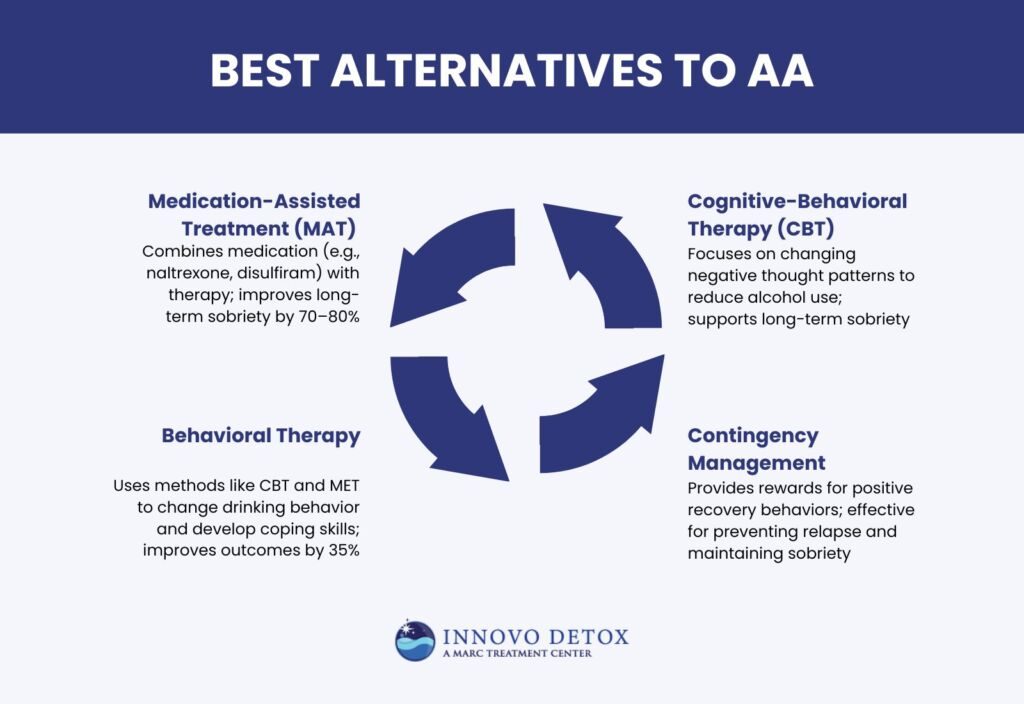
The best alternatives to AA are explained below:
- Medication-Assisted Treatment (MAT): MAT combines the use of FDA-approved medications with counseling and therapy to treat alcohol addiction. Medications like disulfiram, naltrexone, and acamprosate work by reducing cravings and the desire to drink, while counseling provides the emotional support needed for lasting recovery. According to the National Institute on Alcohol Abuse and Alcoholism (NIAAA), MAT significantly improves sobriety rates, with 70-80% of individuals who participate in MAT achieving better long-term outcomes compared to traditional methods.
- Behavioral Therapy: Behavioral therapy focuses on helping individuals change their drinking behavior through a range of techniques, including cognitive-behavioral therapy (CBT) and motivational enhancement therapy (MET). These therapies teach individuals to recognize the triggers for alcohol use and develop healthier coping mechanisms. According to a study by the National Institute on Alcohol Abuse and Alcoholism (NIAAA), CBT has been shown to improve both mental health and sobriety outcomes by 35% in those with alcohol use disorder.
- Cognitive-Behavioral Therapy (CBT): CBT helps individuals recognize and alter negative thought patterns that contribute to their alcohol use. By changing how they think about and respond to triggers, individuals reduce their reliance on alcohol to cope with stress or emotions. The NIAAA reports that CBT is an evidence-based therapy that significantly contributes to long-term sobriety in those with alcohol dependence.
- Contingency Management: Contingency management uses a system of rewards to reinforce positive behavior and sobriety. Participants earn tangible rewards for attending sessions, abstaining from alcohol, or achieving other recovery milestones. This approach is effective in increasing sobriety rates. According to the National Institute on Alcohol Abuse and Alcoholism (NIAAA), contingency management is highly effective for individuals who have struggled with repeated relapses.
How Are Online Alcohol Support Groups Helping Recovery?
Online alcohol support groups are helping recovery by providing flexible, accessible, and remote options for individuals seeking help with alcohol addiction. These groups allow participants to attend meetings from the comfort of their homes, making it easier for people who face barriers like geographical limitations, health issues, or busy schedules to engage in remote recovery.
Through virtual meetings, individuals connect with peers who understand their struggles, offering the same level of support and accountability as in-person gatherings. Additionally, sobriety apps and digital support tools enhance these programs, providing continuous access to resources, motivational messages, and reminders to stay committed to sobriety.
The anonymous recovery aspect of online support groups also appeals to those who value privacy and wish to keep their participation confidential.
According to a study by the National Institute on Alcohol Abuse and Alcoholism (NIAAA) titled “Alcohol Use Disorder and Alcohol Treatment,” 2023, online alcohol support groups have increased participation by 40%, with individuals reporting higher engagement due to the convenience and anonymity these digital platforms offer.
What’s The Difference Between Support Groups And Alcohol Therapy?
The difference between support groups and alcohol therapy lies in the structure and approach to treatment. Support groups focus on peer-led mutual support and shared experiences, while alcohol therapy involves professional treatment, including counseling and evidence-based techniques tailored to individual needs.
The table below shows the differences between support groups and alcohol therapy:
| Aspect | Alcohol Support Groups | Alcohol Therapy |
| Definition | Peer-led groups provide mutual support based on shared experiences. | Professional treatment involves clinical care and individualized therapy sessions. |
| Focus | Focus on peer support and shared recovery experiences. | Focus on professional counseling, mental health treatment, and addiction services. |
| Approach | Provides a community environment that fosters accountability and shared learning. | Uses evidence-based practices, such as outpatient therapy, to treat addiction and address underlying mental health issues. |
| Format | Involves group meetings, on a voluntary and anonymous basis. | Involves one-on-one or group therapy with a licensed therapist or counselor. |
| Duration | Ongoing participation, long-term, to maintain sobriety and build relationships. | Duration varies based on treatment needs, but usually involves structured, time-limited sessions. |
What Are The Benefits Of Alcohol Support Groups?
The benefits of alcohol support groups are providing a sense of community, reducing feelings of isolation, and offering continuous encouragement from peers who understand the struggles of addiction. These groups also serve as a valuable resource for relapse prevention, helping individuals stay committed to their recovery journey through ongoing mutual support.
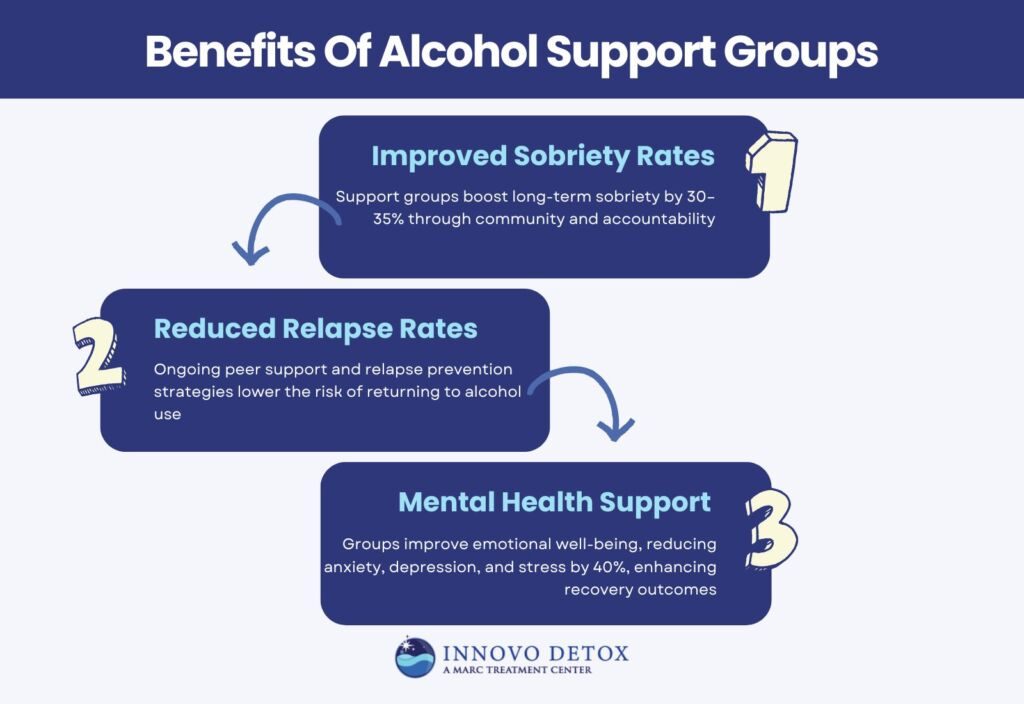
The benefits of alcohol support groups are explained below:
- Improved Sobriety Rates: Alcohol support groups significantly contribute to sobriety rates by providing individuals with a supportive community and accountability. Studies show that participants in support groups experience a 30-35% improvement in long-term sobriety outcomes compared to those not involved in such groups. According to the National Institute on Alcohol Abuse and Alcoholism (NIAAA), peer support success plays a critical role in achieving sustained sobriety.
- Reduced Relapse Rates: Alcohol support groups help individuals reduce the risk of relapse by offering relapse prevention strategies and continuous encouragement from others who are in recovery.
- Mental Health Support: Support groups provide valuable mental health support, addressing the emotional and psychological challenges that accompany alcohol addiction. Many participants report improved emotional well-being and reduced anxiety, depression, and stress through shared experiences. A study by the National Institute on Alcohol Abuse and Alcoholism (NIAAA) found that individuals who engage in support groups experience a 40% improvement in mental health symptoms, which enhances their overall recovery outcomes.
How Can I Find Alcohol Support Groups Near Me?
You can find alcohol support groups near you by searching online for local meetings or using websites such as the Alcoholics Anonymous directory or the SMART Recovery locator. Many organizations also provide virtual meetings, making it easier to access alcohol addiction treatment support from anywhere, regardless of location.
Ways to find alcohol support groups near me include the following:
- Local Meetings: You find local meetings by visiting websites like the Alcoholics Anonymous directory, which lists available meetings in your area. These meetings are held at community centers or churches and provide in-person support for individuals in recovery.
- Community Centers: Many community centers offer alcohol support group meetings as part of their outreach programs. These locations are easily accessible and connect you with local groups dedicated to sobriety support.
- Recovery Locations: Recovery locations, such as rehabilitation centers or treatment facilities, have information about support groups in the area. These facilities host their own support meetings or provide referrals to nearby groups that cater to individuals in recovery.
- Mental Health Resources Near Me: Mental health resources near me help locate alcohol support groups, as they work in tandem with addiction services. Contact local mental health clinics or search for services online to find relevant programs for your recovery journey.
What Should I Expect At My First Alcohol Support Group Meeting?
At your first alcohol support group meeting, you expect an introduction to the meeting format, which involves a brief opening, followed by group sharing where participants discuss their experiences and challenges with alcohol addiction.
The group will go over support group rules, which often include respect for others, active listening, and confidentiality, ensuring that what’s shared in the group stays within the group. As a newcomer, expect a welcoming environment where people will share their stories, offer support, and guide you through the process of becoming part of the community.
What Are The Most Common Misconceptions About Alcohol Support Groups?
The most common misconceptions about support groups are that they require participants to be religious or that they are only for people who have hit rock bottom. In reality, support groups are inclusive and focus on providing peer support for anyone seeking recovery, regardless of their background or the severity of their addiction.
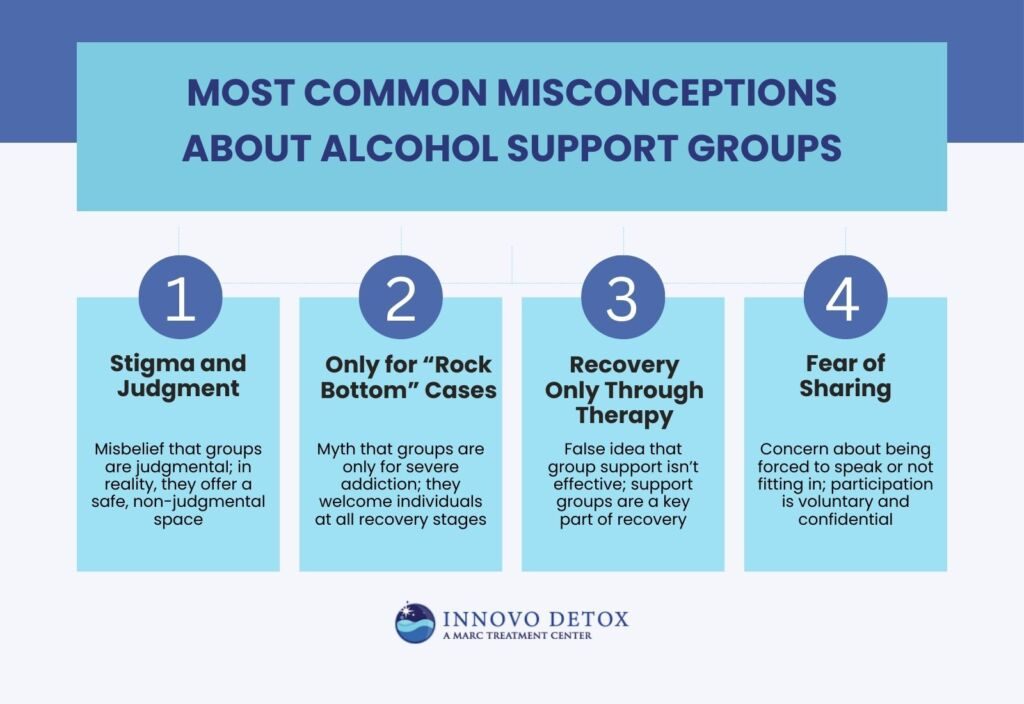
The most common misconceptions about alcohol support include:
- Stigma and Judgment: One common misconception is that alcohol support groups are judgmental or stigmatize participants for their addiction. In reality, these groups focus on creating a safe, non-judgmental space where individuals share their experiences and receive peer support without fear of criticism or rejection.
- Support Group Myths: Some people believe that support groups are only for those who are severely addicted or have hit rock bottom. However, these groups welcome individuals at any stage of recovery, offering support for those who are just starting their journey or trying to maintain their sobriety.
- Recovery Misconceptions: Another misconception is that recovery only happens through professional therapy or medical treatment, not through group support. While therapy is important, support groups are an integral part of the recovery process, providing ongoing encouragement and relapse prevention strategies from others who understand the struggle.
- Group Participation Fears: Many individuals fear that joining a support group will require them to share personal details or that they won’t fit in. In fact, group participation is voluntary, and most groups offer confidentiality and respect, ensuring a supportive environment for everyone, regardless of how much or how little they wish to share.
What Are The Limitations Of Alcohol Support Groups?
The limitations of alcohol support groups include their reliance on peer support rather than professional medical treatment, which does not address all aspects of an individual’s addiction. Additionally, some individuals feel uncomfortable with group dynamics or struggle to relate to others in the group, potentially hindering their recovery process.
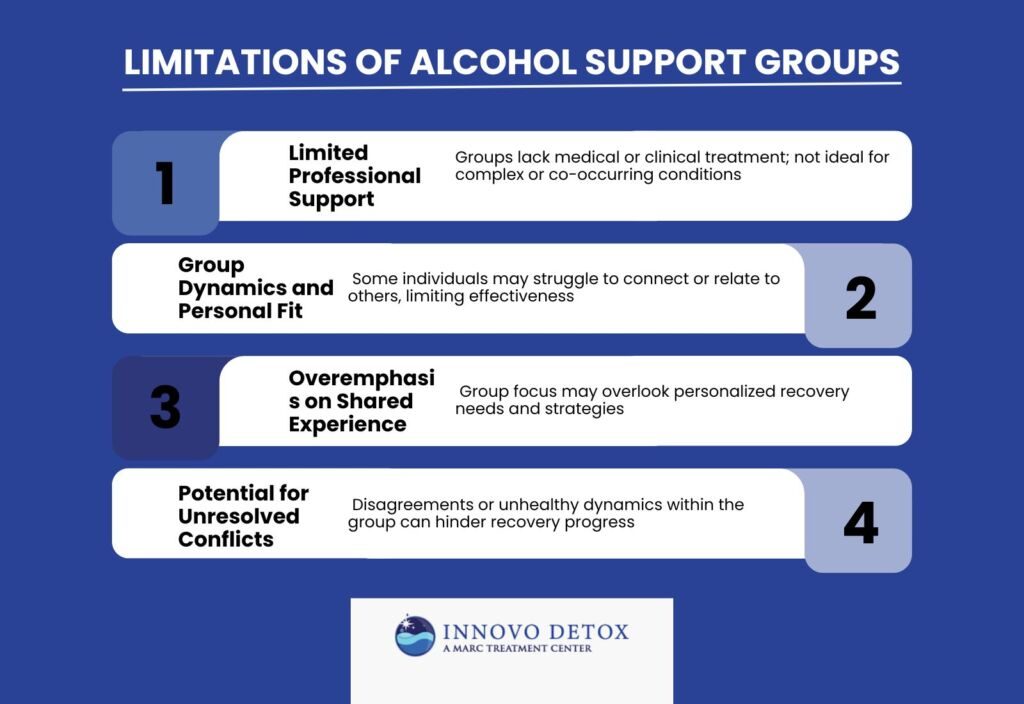
The limitations of alcohol support groups are explained below:
- Limited Professional Support: Alcohol support groups primarily offer peer support rather than professional medical care, which limits their ability to address more severe aspects of addiction, such as co-occurring mental health disorders. According to the National Institute on Alcohol Abuse and Alcoholism (NIAAA), peer support is effective for many individuals but should be supplemented with professional therapy for a more comprehensive treatment approach.
- Group Dynamics and Personal Fit: Some individuals find it difficult to relate to others in the group, which affects the effectiveness of support, especially for those who feel isolated in their experiences.
- Overemphasis on Shared Experience: While sharing experiences in support groups is valuable, it sometimes leads to a focus on group dynamics rather than individualized recovery strategies. According to the NIAAA, although group recovery is beneficial, it does not always address the specific needs of each participant, especially those with complex substance use disorders.
- Potential for Unresolved Conflicts: Peer support groups occasionally lead to conflicts or unhealthy dynamics if members disagree or if unaddressed issues arise within the group.
How Can I Make The Most Of My Alcohol Support Group Experience?
To make the most of your alcohol support group experience, it’s important to actively engage in the meetings, participate in peer interaction, and set clear recovery goals for yourself. Consistency is key, so try to attend meetings regularly and track your progress to stay motivated. Additionally, use the sobriety tools and coping strategies shared by others in the group, and don’t hesitate to offer support to others as well. By fully immersing yourself in the recovery process and being open to the support provided, you’ll build a strong foundation for long-term sobriety.
Are There Support Groups For Co-Occurring Mental Health Conditions?
Yes, there are support groups specifically designed for individuals with co-occurring mental health conditions and substance use disorders, referred to as dual diagnosis or co-occurring disorders (COD).
According to a study by the National Institute on Drug Abuse (NIDA) titled “Co-Occurring Disorders and Addiction Treatment,” 2023, nearly 9.5 million adults in the U.S. experience both a mental health disorder and a substance use disorder, highlighting the prevalence of psychiatric comorbidity.
These support groups address both mental health and addiction issues, providing a comprehensive recovery model. They offer an integrated approach to recovery, combining support for mental health recovery with strategies for overcoming substance use disorder (SUD).
Are There Support Groups For Families Affected By Alcohol Use?
Yes, there are support groups specifically for families affected by alcohol use, such as Al-Anon, which provides support for the loved ones of individuals struggling with alcohol addiction.
These groups help family members understand the impact of addiction on their relationships and mental health, while offering coping strategies and emotional support. By attending these groups, family members find solace in connecting with others who are going through similar experiences, ultimately fostering a sense of community and healing.
These support networks also teach how to set healthy boundaries and navigate the challenges of supporting someone in recovery.
Why Should I Take The First Step Toward Joining A Support Group?
You should take the first step toward joining a support group because it provides an opportunity to connect with others who understand your struggles, offering valuable peer support. Taking this step is crucial in building a strong foundation for sobriety, as support groups help with relapse prevention and guide you through the challenges of the recovery process.
Reasons to take the first step towards joining a support group include:
- Overcoming Hesitation: Taking the first step toward joining a support group is essential because it marks the beginning of your recovery journey. Peer support entry provides a foundation of understanding and encouragement, helping you overcome fear or uncertainty and move forward with confidence.
- Access to Addiction Help: Support groups offer crucial addiction help, providing access to the shared wisdom of others who have faced similar struggles. By joining, you gain valuable tools and strategies for maintaining sobriety, which are vital for preventing relapse and staying on track.

